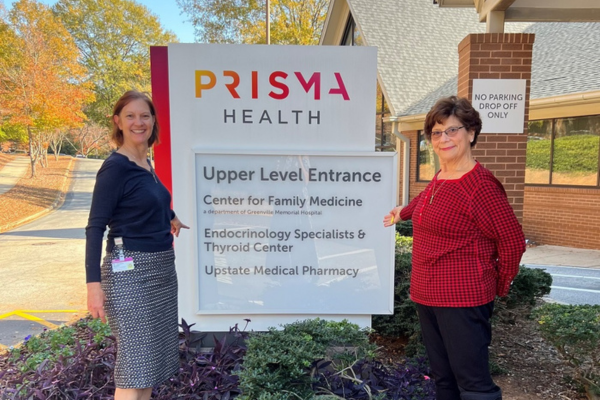Moving the Needle on Vaccinations: Lessons from AACE’s Health System Partners
Spotlight on Prisma Health

When Sandra Weber, MD, and Shirley Parker, RN first looked at the immunization coverage data at Prisma Health Endocrinology Specialists and Thyroid Center in Greenville, South Carolina, they asked themselves a key question to help them identify what care needed to be improved: "What is the true care gap?"
That question led them on an 18-month journey that has resulted in system-wide changes at Prisma and improvements in the vaccination coverage data for the state of South Carolina.
According to Dr. Weber, knowing the "true" care gap was – and is- critical to directing quality improvement efforts to the appropriate patient group(s) or provider(s). Getting to the "true" care gap, however, can prove challenging!
Who isn’t getting vaccinated?
When Dr. Weber and Ms. Parker started working to find the "true" care gap, they were working to identify which patients were not up to date on three vaccines – COVID-19, influenza, and pneumococcal. They were interested in identifying the patients who had refused vaccinations. They recognized that they would need different kinds of interventions for patients who had refused to receive a vaccine so identifying patient refusals were important.
A review of the vaccination data revealed more questions than answers – so Dr. Weber and Ms. Parker started asking more questions…and more questions…and more questions!!
How questions about refusals led to system-wide changes at Prisma
Dr. Weber and Ms. Parker’s questions about refusals led them to their organization’s vaccination committee. Prior to their involvement in the CMSS-CDC grant with AACE, they did not know about this committee’s work.
Dr. Weber and Ms. Parker had a request: could they change the codes in the EHR (EPIC) to help them identify why people are refusing? The codes that were currently available in a dropdown menu to specify "why" a patient was refusing a vaccine didn’t seem particularly relevant to vaccine refusal. Over the course of 18 months, Dr. Weber and Ms. Parker had multiple discussions with the committee. These discussions ultimately helped create an awareness that efforts to improve vaccinations should not only focus on pediatric patients but the adult community, too. In April 2024, Prisma rolled out a new list of refusals in their EHR which would be used with all patients and by all providers for all types of care.
How questions about missing data led to improvements in state-level data
When Dr. Weber and Ms. Parker started a deeper dive into Prisma’s immunization data, they worked to understand what data were missing. First, they learned that the vaccine data from Prisma’s EHR did not include the immunization records of Prisma employees who received vaccinations at Prisma. The solution was to get Prisma Employee Health to upload data to the South Carolina State Repository System and then Prisma Health could download those records. Issue one solved!
Once Prisma was up and rolling with the state’s system, they were able to identify some additional “gaps” in the data. Ms. Parker assessed the vaccination status of all patients seen in the clinic for one month. She began to see patterns when she compared the data to what patients were reporting. For many patients, the EHR was not consistent with what the patient reported. A few patterns emerged. First, when a veteran received a vaccination at the VA, those data were not reported to the state. So, Prisma’s records did not include those patients’ vaccination data. Second, there were several third-party entities providing vaccinations (pharmacies, employers, pop-up sites and traveling providers) who were not reporting to the state repository. Through "carrot and stick" approaches led by the state, these third-party entities started reporting their data. This led to a huge "data dump" of influenza vaccine data in December 2023.
The VA, however, is not sharing their data with the state. Further research revealed that South Carolina is one of handful of state, territory, and entities that do not receive data from the VA.
Working to solve the real "care gaps"
The process that Dr. Weber and Ms. Parker have led over the past two years at Prisma will ultimately position Prisma to be able to develop interventions to address the "true" care gaps. As Dr. Weber noted, it’s critical to use the time you have with patients wisely. Working to address the data issues helps Dr. Weber, and other endocrine providers at Prisma, focus on the patients who need the discussions the most. Instead of spending time figuring out if a patient’s documentation is current, they now can focus on education and finding out "why they didn’t get the vaccine." This focus can help Prisma address the "real" vaccine care gaps for their patients with diabetes and other endocrine disorders.
